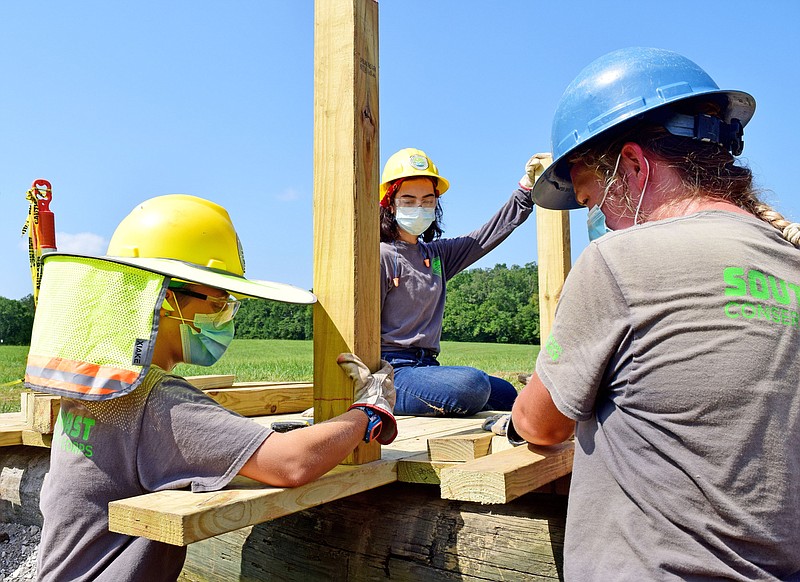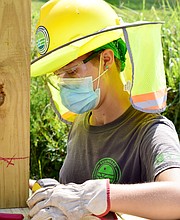Brenna Kelly didn't grow up hiking or camping and hardly considered herself an outdoorsy person. Yet after she graduated from college in Louisville, Kentucky, in 2002 and was looking for her next adventure, she settled on the idea of doing something that involved the outdoors.
She says she was lucky to be financially able to take the time to discover who she was and what she wanted out of life, but at the time she really had no idea.
"I was searching," she says, adding that, for some reason, she got online and entered the keywords "work outdoors." That led her to becoming part of a six-month AmeriCorps team in the California Conservation Corps, clearing backcountry trails.
It was a pretty big leap for her.
"I'd never camped or used the bathroom in the woods before," she says.
She fell in love with the work, eventually signing on for similar assignments in Alaska, Washington, Oregon, Arizona and Colorado through AmeriCorps, which oversees a national network of service programs. She loved the work, and the idea. So when she and her husband, Pat Kelly, decided in 2011 that they wanted to be closer to her family in Kentucky and his in Nashville, he half-jokingly suggested she start a conservation corps in the South.
"I took the challenge and applied to become an AmeriCorps VISTA and wrote a grant to start a conservation corps in the region," she says, referring to AmeriCorps' long-standing Volunteers In Service To America program. She modeled it on the legacy of the Civilian Conservation Corps, focusing on connecting people to the natural environment through conservation-based service learning, personal development and recreation.
She settled on Chattanooga as the perfect place because it offered the right blend of terrain, as well as need and opportunity.
"We wanted mountains and water, but Chattanooga also has so many opportunities," she says. "There is a lot of shine on the diamond here, but there is a lot of dirt as well. There are a lot of communities not being served."
More Info
Get more information on the Southeast Conservation Corps at southeastconservationcorps.org/.
Kelly convinced the folks at La Paz, a Chattanooga Latinx support organization, to serve as an incubator for work early on. Out of that she created the Southeast Conservancy Corps in 2013. It is one of six corps - Arizona Conservation Corps, Appalachian Conservation Corps, Conservation Corps New Mexico, Conservation Corps North Carolina and Stewards Individual Placement Program are the others - supported by Conservation Legacy.
It is AmeriCorps affiliated, which Kelly says means she gets some grant money from them and follows some overarching guidelines involving things like insurance, but the majority of decisions are made locally.
Essentially, the SECC matches local teens and young adults who want to get their hands dirty working outdoors with local organizations that have jobs that need doing in the great outdoors - things like clearing trails or creating new trails and bridges.
Some, such as the members in the Veterans Fire Corps, can go on to full-time careers. Some do one stint, or hitch, and move on.
Some hitches are done during the day, and the workers go home each night. Other hitches involve on-site camping. How long each lasts depends on the job and funding. They can take up to six months, with the crews working nine days on and four days off.
Locally, she works with organizations such as the Lula Lake Land Trust, the Trust for Public Land and the National Park Service.
Like Kelly, Emily Mathis, 25, was at a crossroads a couple of years ago. After two years of studies at Chattanooga State Community College, she'd lost some of her passion for school, and for her job bartending, and was looking for something new. Also, like Kelly, she had little to no experience working in the great outdoors.
But after a 25-day solo rafting/camping excursion through the Grand Canyon, she thought she might like to pursue other opportunities. She, too, searched online for "work outdoors" and landed on the SECC website.
She found Southeast Conservation Corps and signed up for a nearly two-month hitch with a crew working on the Natchez Trace Trail system.
"And I liked it a lot," she says.
"It was tough at first," she admits. "I mean, I'd never really used the bathroom in the woods."
She then worked a local day crew at the Chickamauga and Chattanooga National Park, where she would work an eight-hour shift and go home.
Enjoying those opportunities, she signed up for more crews and began thinking about becoming a crew leader.
"I had never really been a leader, but it built my confidence, and I thought I could do it."
The day-camp hitches worked well with her bartending schedule as well. She says she wants to continue working with SECC as she pursues her degree in biology.
"Honestly, getting back into the corps made me want to finish my bachelor's degree so I can get a really good job. It has been great for improving my leadership skills," she says.
"I don't see an end to doing it because it is just going to benefit me."
Kelly says Mathis is just one example of the opportunities the SECC provides. Crew members range in age from high school students to young adults in their early 20s and 30s.
Workers get a "living wage," and things like transportation and food are supplied. Crew members are responsible for clothing, tents and bedding, but lack of funds should not be a deterrent, Kelly stresses.
"We find a way if someone wants to do this," she says.
And, obviously, experience is also not a requirement.
She says the corps, which has a full-time staff of three, plus one part-timer, has crews for deaf and hard-of-hearing individuals, as well as mountain biking crews targeted to inner-city youth who have not experienced the outdoors before.
"Young people can go out in nature and terrify yourself by riding a mountain bike for the first time," she says with a laugh. "It's really about dipping your toes in these waters."
"This is literally for everyone."
Contact Barry Courter at bcourter@timesfreepress.com or 423-757-6354.

